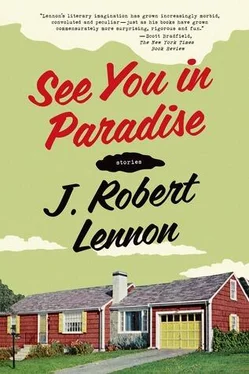“Hey,” he said, his pupils dilated, his shoulders faintly heaving. “What’s the matter?”
“John,” I said. “I’m sorry to tell you this. I already ate.”
The fork slowly descended to the plate.
“Why didn’t you say?” he wanted to know.
“You’d already cooked it.”
“You could have called home.”
“John,” I said, meeting his hurt and angry gaze. “I don’t know you. You moved in this morning. Why would I expect you to cook dinner for me?”
He waved his hand in front of his face, sweeping the question away. “We’re roommates,” he said. “We have to show one another a little bit of respect.”
I should have kicked him out right then and there. But I didn’t. How could I? You don’t kick a man out of his home for making you dinner. And I had already cashed the check.
“All right,” I said. “I’m sorry.” And I picked up my knife and fork and went to work.

The apartment building in question stood, or rather lay, at the bottom of a mountain. It was a one-story strip of six units, with four arranged in a row and two more at an angle, to accommodate a rock outcropping in the back. Our apartment was one of the ones on the angle, and our back windows looked out at the outcropping. Even at the height of summer, we didn’t get a single ray of sunlight until midafternoon.
The mountain was called Mount Peak — a terrible name for a mountain. It didn’t even have a peak: it was rounded on top. It was part of the western foothills of the Rockies, and though this all sounds very bracing and natural, the fact is that Mount Peak was, in almost every sense, a thoroughly shitty mountain. The southern third had been completely chopped off to make way for a highway, its western face had been logged and stood bare and weedy. An abandoned housing project jutted out to the north like a tumor. In addition, about a hundred feet above our apartment, the local high school had spelled out the name of its mascot, BEAVERS, in white-painted stones, and a few of these would roll down each week and thump against our back wall. Sometimes one of them would ricochet off a tree stump and crash through a window.
Even the wildlife looked scraggly and sick. Mangy elk could often be found mornings, standing around in the parking lot looking confused. You would have to honk at them to leave, if you were lucky enough to own a car. We once found a dead bighorn sheep lying on our front stoop, and another time we had to cancel a dinner date because a scrawny, insane-looking moutain lion was standing outside our door, growling.
By “we” I don’t mean John Weber and me; I mean Ruperta and me. Ruperta was my girlfriend. She left me because we had sex problems — specifically, the not having of it. It was my fault. I didn’t want to do it anymore. All I wanted to do was read and reread from my library of books about trains. It was my interest in trains that caused me to rent this place, with Ruperta, five years before; if you hiked to the south end of the mountain you got a great view of the tracks down below. But a few months after we moved in, the only freight company that used the tracks went out of business, and they fell into disrepair.
Honestly, I don’t know what was wrong with me. I felt like I was slowing down. I had moved to this town to go to graduate school in environmental and land use law, and I suppose I lost enthusiasm. To be sure, the subject was not very interesting to me. I read a lot of thick, boring books, and went on field trips to see how various ranches diverted creek water. Then, one day, while inspecting a barbed-wire fence as part of a summer internship, I fell into a ravine and broke my arm. When I got out of the hospital, I had lost all desire to return to school, and I started begging off when Ruperta wanted to get it on. She put up with that for a very long time, and this reasonableness caused me to lose all respect for her, respect I regained the moment she left. I missed her terribly.
Since quitting school, I had worked for eight dollars an hour editing the newsletter of a hunting and conservation outfit. The work took about three hours each week, so I spent the rest of the time pretending to do it and posting on internet messageboards under a variety of names. I chatted all day long about knitting, veganism, soccer, scrapbooking, and dog grooming, none of which I knew anything about, nor cared to learn. I was thoroughly debased, and at thirty-two felt like I’d been an old man for a long time. I saw no way of escaping the life I’d made for myself, save for the mountain falling down and crushing me.

Weber was also probably around thirty, but his girlfriend, Sandy, looked closer to forty. Forty-two, if I had to make a precise guess. She came twice a week to spend the night in Weber’s room, where some kind of new age harp CD was cued up and left to repeat all night long. I asked Weber if he could turn the music off after midnight, and he laughed. “Of course not!” he said.
“Why not? It’s hard to sleep.”
“Well, Sandy can’t sleep without it.”
“But Sandy doesn’t live here. I live here.”
“Sandy is a guest.” He shook his head. “I’m disappointed in you. You don’t know how to treat a guest, do you. You should be ashamed of yourself.”
I actually got to spend a fair amount of time alone with Sandy, since Weber liked to sleep in on the mornings after her visits — he was actually still in school, studying I don’t know what — and she, like me, was an early riser. We sat across from one another at the table, me with the paper, she with nothing, drinking from gigantic mugs of coffee. She made cryptic little pronouncements in a withered, weary voice.
“John doesn’t like coffee.”
“There’s a nuclear missile near here, I bet you didn’t know that.”
“John used to race bicycles competitively.”
“It’s possible to get certain diseases from fish, you know.”
One morning in late autumn she said, incredibly, “John is a genius, you know.”
I could not resist. “He is?”
Beneath her haylike skirt of hair, her chin seemed to nod very slightly.
“What’s he a genius of?”
“Art,” she replied.
“Art?”
“Sculpture. He’s a sculpturist.”
“I would never have guessed.”
It was hard to see what her eyes were up to under there, but I had the feeling they were glaring at me. We drank our coffees for several minutes.
“Don’t be an asshole,” Sandy said.

It was another week before I found out exactly what type of sculpturism Weber was getting up to in his room. He had invited me in there more than once, usually so that I could hear one or another horrible song that he was grooving on:
“Hey, come listen to this!”
“I can hear it from out here,” I would reply from the living room.
“No, you can’t. You need to get the full audio spectrum.”
“John, I can hear enough out here to know I don’t want to come in there and hear it better.”
A moment of silence that suggested deep puzzlement, and then he would emerge wearing a pained expression. “You mean you don’t like it?”
“No.”
“How can you not like this?” Gesturing back toward the room.
“By hearing it, and then considering my feelings about it, and then deciding I don’t like it.”
“You know,” he said on one of these occasions, “it really hurts my feelings when you won’t listen to my music.”
At which point I set down Small-Gauge Railways of the American Northeast , carefully marking the page with a magazine subscription card, and said, “One, it isn’t your music, John. You didn’t compose it or perform it. It’s somebody else’s music that you happen to like. And two, we don’t have to like the same things. Do I keep asking you to look at pictures of trains?”
Читать дальше













